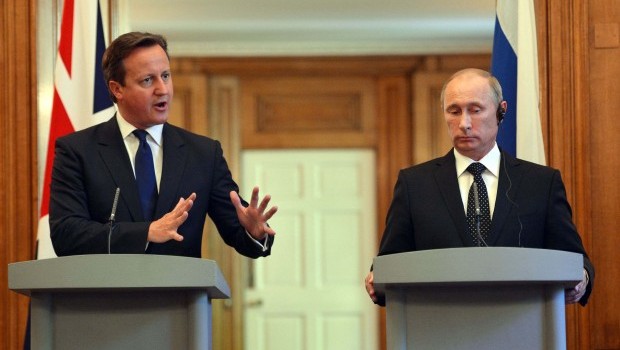
Britain’s Prime Minister David Cameron (L) and Russia’s President Vladimir Putin hold a joint news conference in 10 Downing Street, central London June 16, 2013. The two leaders met ahead of the G8 summit in Northern Ireland. (REUTERS/Anthony Devlin/Pool)
British Prime Minister David Cameron, who chairs the G8 summit in Northern Ireland, acknowledged there was “a big difference” between the positions of Russia and the West on Syria. Moscow said it would not permit no-fly zones to be imposed over Syria.
US President Barack Obama will meet Putin later on Monday and, in what could be a frosty encounter, will try to convince the Kremlin chief to bring Assad to the negotiating table. Putin has warned the West it risks sowing turmoil across the Middle East by arming the Syrian rebels.
Other Western leaders criticized Russia, Assad’s only big-power ally, for delivering arms to Assad while the rebels—whom Putin described on Sunday as cannibals who ate their enemies’ intestines—perished.
“How can we allow that Russia continues to deliver arms to the Bashar Al-Assad regime when the opposition receives very few and is being massacred?” French President Francois Hollande said.
Canadian Prime Minister Stephen Harper said Putin was supporting Assad’s “thugs”. “I don’t think we should fool ourselves. We, the G7 + 1, that’s what this is, we in the West have a very different perspective on this situation,” Harper said.
Stung by the Iranian-backed Hezbollah’s recent victories for Assad’s forces in the civil war, the United States said last week it would step up military aid to the rebels including automatic weapons, light mortars and rocket-propelled grenades.
The European Union has also dropped its arms embargo on Syria, allowing France and Britain to arm the rebels, though Cameron expressed concern about some of Assad’s foes.
“Let’s be clear – I am as worried as anybody else about elements of the Syrian opposition, who are extremists, who support terrorism and who are a great danger to our world,” Cameron said.
Obama and Putin are due to meet at about 6:30 pm local time (0530 GMT) at the Lough Erne golf resort about 10 kilometers outside the Northern Irish town of Enniskillen, scene of an IRA bomb attack in 1987 that killed 11 people.
Security was tight and the venue was surrounded by a high steel fence, though Cameron was keen to showcase the relative peace in Northern Ireland as it tries to attract investment after decades of trouble.
In a speech in Belfast, Obama urged young people in Northern Ireland to finish making “permanent peace” and set an example to other areas of the world stricken by conflict.
Cameron could also face some awkward questions at the G8 table after a Guardian newspaper report that Britain spied on officials taking part in two Group of 20 meetings in 2009.
The leaders of the United States, Japan, Canada, Russia, Germany, France, Britain and Italy—representing just over half of the $71.7 trillion global economy—will also discuss global economy and trade.
The leaders of the EU and United States are due to announce the start of formal negotiations on a free trade deal that could be worth more than $100 billion a year to each economy.
“We expect the negotiations to start as soon as possible, most likely July,” European Commission President Jose Manuel Barroso said.
Japanese Prime Minister Shinzo Abe, German Chancellor Angela Merkel and other leaders will probably discuss the role of central banks and monetary policy.
They are likely to say they are not content with progress so far in fixing their economies in the wake of the global financial crisis, according to a draft communique seen by Reuters.
Abe will use the opportunity to explain his blend of fiscal and monetary stimuli known as ‘Abenomics’ to the leaders as investors try to absorb the implications of a signal by the US Federal Reserve it may start to slow its money-printing.
Fed chairman Ben Bernanke will not attend. He and his colleagues hold a policy meeting on Tuesday and Wednesday.
Cameron has made tackling tax avoidance—which campaigners say costs about $3 trillion a year—a main part of the formal agenda at the summit.
He has turned up the pressure to clamp down on secretive money flows by pressing Britain’s overseas tax havens into a transparency deal and announcing new disclosure rules for British firms.
Representatives of overseas tax havens linked to Britain on Saturday agreed to sign up to an international transparency protocol. Aid campaigners said Britain’s action will count for little if the rest of the G8 does not follow suit.
G8 leaders will probably shy away from adopting a measure aimed at curbing tax avoidance by highlighting when companies channel profits into tax havens, and will include a watered-down alternative, according to the draft communique.
“I particularly care that we track down tax evaders, especially to end tax avoidance,” Merkel told German TV Station RTL. “That only works through international cooperation.”
